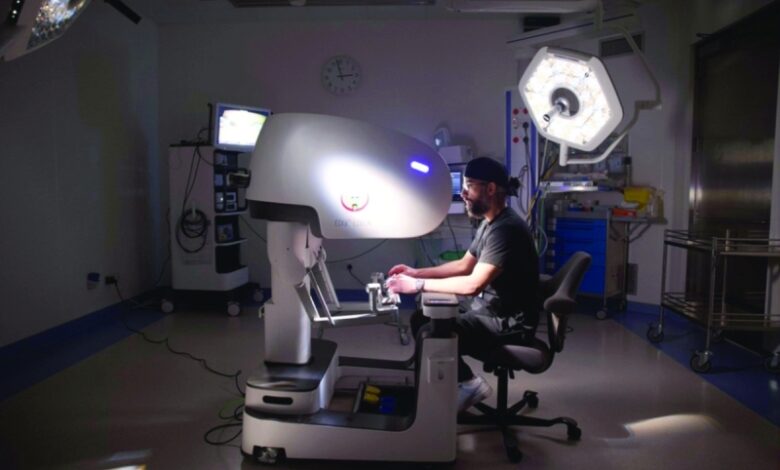
-
The surgical robotics market in Kuwait, valued at $38 million in 2024, is projected to reach $59.8 million by 2030. Since 2014, when the Sabah Al-Ahmad Kidney and Urology Center introduced the da Vinci Xi robotic system, Kuwait has steadily advanced in the field of robotic-assisted surgery.
-
Dr. Al-Dosari performed the first remote robotic surgery from China on a patient in Kuwait. Jaber Hospital completed 100 delicate surgeries in 2022, while March marked the first robotic knee replacement. Each imported device costs one million dinars.
Robotic surgery in Kuwait has moved from concept to reality, marking a major step in the country’s medical sector. Kuwait is positioning itself as a regional leader in combining advanced technology with healthcare.
Procedures now range from minimally invasive prostate surgery to joint replacements and even remote operations. Beyond these achievements, the country is investing in training, research, and innovation to strengthen its role at the forefront of regional healthcare in the 21st century, Al Rai newspaper reported.
A decade of progress and global achievements
Since 2014, when the Sabah Al-Ahmad Kidney and Urology Center introduced the da Vinci Xi robotic system, Kuwait has steadily advanced in the field of robotic-assisted surgery. That first step opened the door for a decade of growth, enabling surgeons to perform highly complex procedures such as prostatectomy, kidney tumor removal, cystectomy, correction of congenital urinary tract anomalies, and minimally invasive surgeries for the abdomen, obesity, and colon.
According to official statistics, more than 1,800 robotic operations have been carried out in Ministry of Health hospitals since the program began until April 2024. The number of robotic devices now exceeds seven, each providing significant benefits to patients.
These include reduced bleeding and pain, fewer complications, shorter hospital stays, and less need for large surgical incisions. The development has not only raised surgical standards but has also positioned Kuwait as a reference point for robotic surgery in the region.
One of the most notable achievements came at the Sabah Al-Ahmad Center, which performed the first remote robotic partial prostatectomy in the Middle East. The operation was led by Dr. Saad Al-Dosari from China, while the patient was in Kuwait, more than 7,000 kilometers away. The success of this pioneering step paved the way for further remote operations, including cases performed in France and Shanghai.
In July 2025, Kuwait also recorded the first remote robotic prostatectomy between Europe and the Middle East, conducted in Strasbourg. More recently, surgeons completed the longest remote robotic surgery in history, spanning over 12,000 kilometers between Kuwait and Brazil, a global first in both distance and precision.
Other hospitals have also contributed to this expansion. Jaber Al-Ahmad Hospital marked its entry into robotic surgery in 2020 with a radical nephrectomy, later followed by a series of complex general surgeries, including bariatric, colon, abdominal wall, and gallbladder operations. By 2022, the hospital had completed more than 100 robotic procedures. Al Farwaniya Hospital has adopted robotic techniques for gastric sleeve surgeries and complex hernia repairs, while Kuwait also saw its first fully robotic knee replacement in 2022 using the MAKO system. This system, now in both public and private hospitals, is designed to improve precision in knee and hip replacement surgeries, leading to faster recovery times.
The Ministry of Health has invested heavily in this transformation, with each robotic unit costing around one million dinars. These investments are tied to a strategy of improving surgical efficiency, reducing errors, and enhancing patient safety.
The financial outlook also highlights strong growth: the surgical robotics market in Kuwait, valued at $38 million in 2024, is projected to reach $59.8 million by 2030. The related services market, covering training, maintenance, and software, is expected to double from $5.3 million in 2023 to $10 million by the end of the decade.
Health Minister Dr. Ahmed Al-Awadhi has emphasized that robotic surgery is now part of Kuwait’s core medical infrastructure. He stressed that the ministry is training national staff to ensure self-sufficiency and to localize the technology.
Advantages of robotic surgery
The advantages of robotic surgery are clear: better outcomes with 3D vision, smaller incisions, faster recovery, shorter hospital stays, stronger digital infrastructure, reduced need for treatment abroad, readiness for future healthcare demands, and enhanced international standing.
With these achievements, Kuwait has not only secured its position as a leader in robotic-assisted surgery in the Gulf but is also moving closer to becoming a regional hub for smart healthcare.












